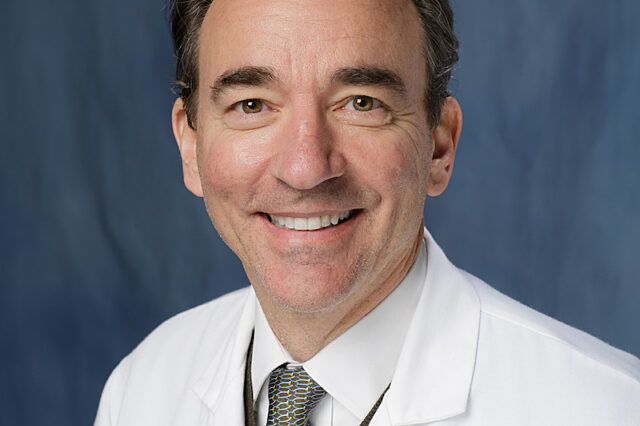Head-on Approach to a Growing Crisis

Dear colleagues,
At University of Florida, the Division of Endocrinology, Diabetes and Metabolism is conducting leading-edge research to learn more about the link between obesity, diabetes and fatty liver disease, and innovating new approaches to diagnosis, management and treatment.
There is an epidemic of obesity and Type 2 diabetes in America, and it’s mounting to a crisis of associated and progressive disorders, including liver damage and cirrhosis. By 2030, it is estimated that 65 million more adults in the U.S. will be obese than in 2010. In Florida, the overall obesity rate among adult health care users between the ages of 20 and 79 years old is estimated to be 37%. It’s therefore no surprise that two often overlooked complications of obesity and diabetes are quickly becoming major health concerns here in Florida and across the country: nonalcoholic fatty liver disease, or NAFLD, which occurs in approximately two-thirds of patients who are obese, and nonalcoholic steatohepatitis, or NASH, which is the more severe form of fatty liver disease and predicted to be the leading cause of liver cirrhosis and transplantation by 2020.
Clinicians often miss the opportunity to diagnose fatty liver disease until it’s too late and has progressed into life-threatening cirrhosis. Early detection is the key and can lead to lifesaving early interventions, such as lifestyle changes, weight loss and pharmacologic treatment.
At UF Health Shands, we’re exploring new strategies to help primary care physicians and endocrinologists become more aware of and proactive in the diagnosis and treatment of obesity and diabetes, as well as exploring multidisciplinary treatment approaches in which endocrinologists and hepatologists work together collaboratively to manage fatty liver disease.
We found that pioglitazone is an effective long-term treatment for steatohepatitis in patients with prediabetes or diabetes. Our team has investigated whether the efficacy of pioglitazone varies depending on a patient’s glucose status — that is, whether they are insulin-resistant or diabetic, and found differences that may impact clinicians’ treatment decisions as well as patient outcomes.
We’re currently looking at a variety of different ways to address the impact of obesity, diabetes, fatty liver disease and steatohepatitis, so we can apply this knowledge to improving outcomes for all patients. This includes groundbreaking research into dietary approaches to weight loss in older adults who are obese, and how weight loss resulting from treatment with a sodium-glucose cotransporter-2, or SGLT-2, inhibitor may benefit patients by reducing liver fat and improving insulin secretion and action.
We are also evaluating the potential role of glucagon-like peptide-1 receptor agonists and insulin-sensitiers in the management of obesity and fatty liver disease. These and other novel therapeutic options under investigation at UF Health hold promise, and may become a cornerstone in the management of both obesity and diabetes in the near future.
Our diabetes and obesity research programs are growing rapidly with new investigators and collaborations in multicenter studies to find new treatments.
For more information about our research, contact our team at 352.294.4896. In addition, please consider us when voting for the U.S. News and World Report rankings for Endocrinology.
Sincerely,
Kenneth Cusi, M.D., FACP, FACE Chief, Division of Endocrinology, Diabetes & Metabolism Department of Medicine University of Florida